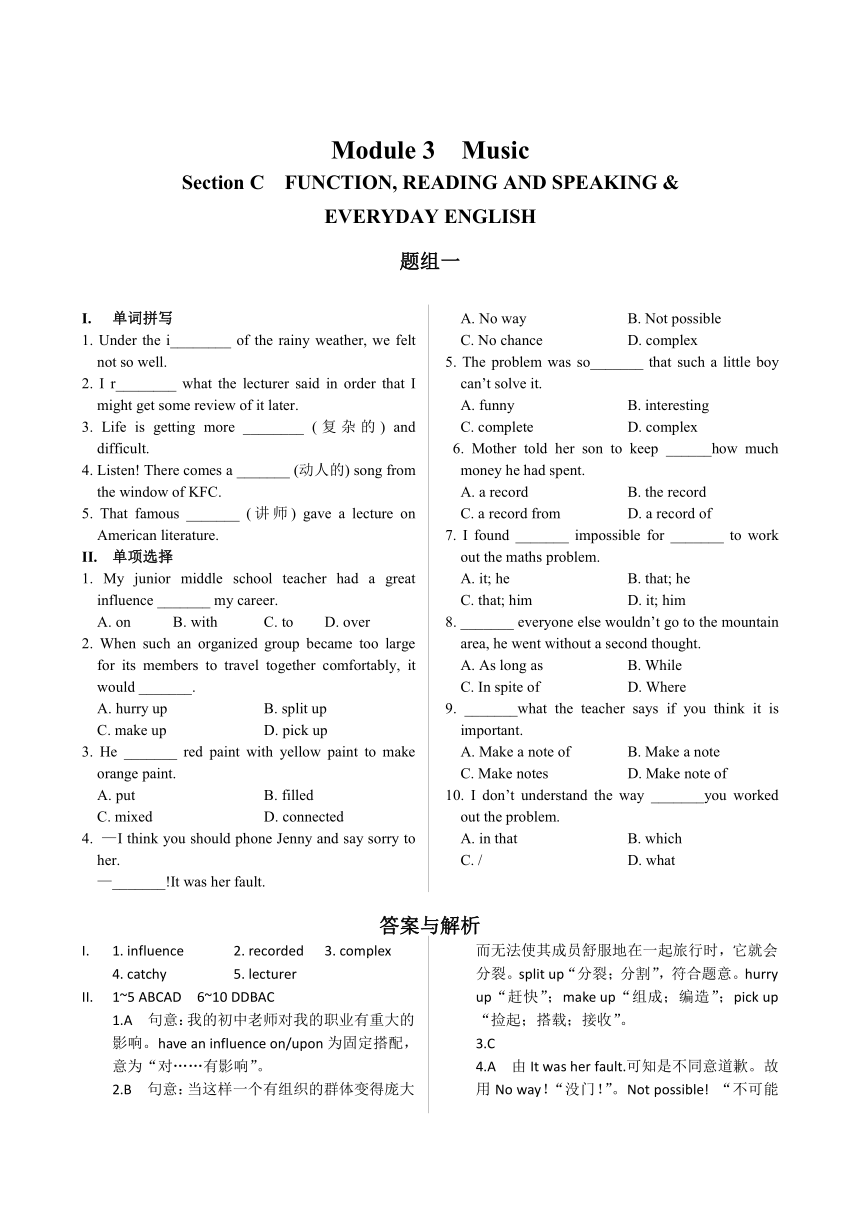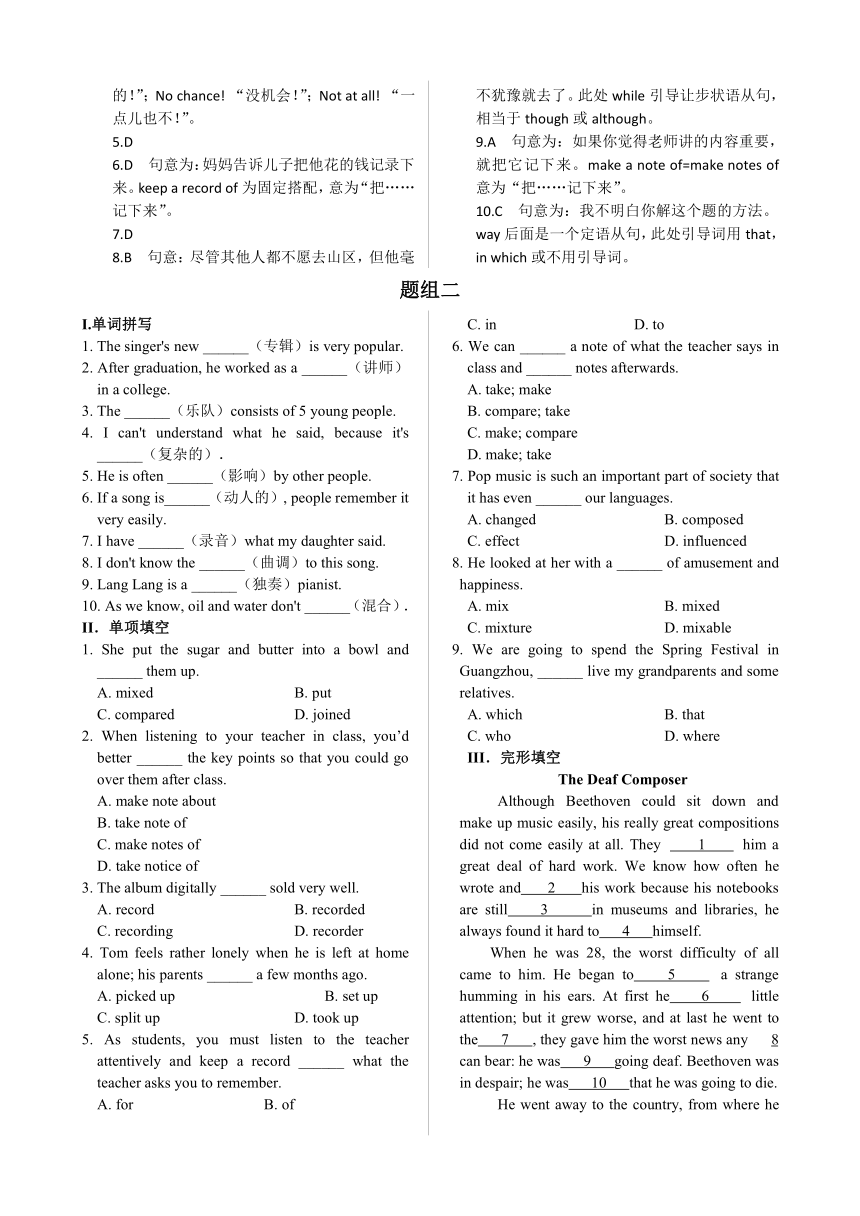2013-2014学年高一英语外研版必修二Module 3 Section C 同步练测(含答案解析)
文档属性
| 名称 | 2013-2014学年高一英语外研版必修二Module 3 Section C 同步练测(含答案解析) |

|
|
| 格式 | zip | ||
| 文件大小 | 22.1KB | ||
| 资源类型 | 教案 | ||
| 版本资源 | 外研版 | ||
| 科目 | 英语 | ||
| 更新时间 | 2014-02-17 00:00:00 | ||
图片预览


文档简介
Module 3 Music
Section C FUNCTION, READING AND SPEAKING &
EVERYDAY ENGLISH
题组一
单词拼写
1. Under the i________ of the rainy weather, we felt not so well.
2. I r________ what the lecturer said in order that I might get some review of it later.
3. Life is getting more ________ (复杂的) and difficult.
4. Listen! There comes a _______ (动人的) song from the window of KFC.
5. That famous _______ (讲师) gave a lecture on American literature.
单项选择
1. My junior middle school teacher had a great influence _______ my career.
A. on B. with C. to D. over
2. When such an organized group became too large for its members to travel together comfortably, it would _______.
A. hurry up B. split up
C. make up D. pick up
3. He _______ red paint with yellow paint to make orange paint.
A. put B. filled
C. mixed D. connected
4. —I think you should phone Jenny and say sorry to her.
—_______!It was her fault.
A. No way B. Not possible
C. No chance D. complex
5. The problem was so_______ that such a little boy can’t solve it.
A. funny B. interesting
C. complete D. complex
6. Mother told her son to keep ______how much money he had spent.
A. a record B. the record
C. a record from D. a record of
7. I found _______ impossible for _______ to work out the maths problem.
A. it; he B. that; he
C. that; him D. it; him
8. _______ everyone else wouldn’t go to the mountain area, he went without a second thought.
A. As long as B. While
C. In spite of D. Where
9. _______what the teacher says if you think it is important.
A. Make a note of B. Make a note
C. Make notes D. Make note of
10. I don’t understand the way _______you worked out the problem.
A. in that B. which
C. / D. what
答案与解析
1. influence 2. recorded 3. complex
4. catchy 5. lecturer
1~5 ABCAD 6~10 DDBAC
1.A 句意:我的初中老师对我的职业有重大的影响。have an influence on/upon为固定搭配,意为“对……有影响”。
2.B 句意:当这样一个有组织的群体变得庞大而无法使其成员舒服地在一起旅行时,它就会分裂。split up“分裂;分割”,符合题意。hurry up“赶快”;make up“组成;编造”;pick up“捡起;搭载;接收”。
3.C
4.A 由It was her fault.可知是不同意道歉。故用No way!“没门!”。Not possible! “不可能的!”;No chance! “没机会!”;Not at all! “一点儿也不!”。
5.D
6.D 句意为:妈妈告诉儿子把他花的钱记录下来。keep a record of为固定搭配,意为“把……记下来”。
7.D
8.B 句意:尽管其他人都不愿去山区,但他毫不犹豫就去了。此处while引导让步状语从句,相当于though或although。
9.A 句意为:如果你觉得老师讲的内容重要,就把它记下来。make a note of=make notes of意为“把……记下来”。
10.C 句意为:我不明白你解这个题的方法。way后面是一个定语从句,此处引导词用that,in which或不用引导词。
题组二
I.单词拼写
1. The singer's new ______(专辑)is very popular.
2. After graduation, he worked as a ______(讲师)in a college.
3. The ______(乐队)consists of 5 young people.
4. I can't understand what he said, because it's ______(复杂的).
5. He is often ______(影响)by other people.
6. If a song is______(动人的), people remember it very easily.
7. I have ______(录音)what my daughter said.
8. I don't know the ______(曲调)to this song.
9. Lang Lang is a ______(独奏)pianist.
10. As we know, oil and water don't ______(混合).
II.单项填空
1. She put the sugar and butter into a bowl and ______ them up.
A. mixed B. put
C. compared D. joined
2. When listening to your teacher in class, you’d better ______ the key points so that you could go over them after class.
A. make note about
B. take note of
C. make notes of
D. take notice of
3. The album digitally ______ sold very well.
A. record B. recorded
C. recording D. recorder
4. Tom feels rather lonely when he is left at home alone; his parents ______ a few months ago.
A. picked up B. set up
C. split up D. took up
5. As students, you must listen to the teacher attentively and keep a record ______ what the teacher asks you to remember.
A. for B. of
C. in D. to
6. We can ______ a note of what the teacher says in class and ______ notes afterwards.
A. take; make
B. compare; take
C. make; compare
D. make; take
7. Pop music is such an important part of society that it has even ______ our languages.
A. changed B. composed
C. effect D. influenced
8. He looked at her with a ______ of amusement and happiness.
A. mix B. mixed
C. mixture D. mixable
9. We are going to spend the Spring Festival in Guangzhou, ______ live my grandparents and some relatives.
A. which B. that
C. who D. where
III.完形填空
The Deaf Composer
Although Beethoven could sit down and make up music easily, his really great compositions did not come easily at all. They 1 him a great deal of hard work. We know how often he wrote and 2 his work because his notebooks are still 3 in museums and libraries, he always found it hard to 4 himself.
When he was 28, the worst difficulty of all came to him. He began to 5 a strange humming in his ears. At first he 6 little attention; but it grew worse, and at last he went to the 7 , they gave him the worst news any 8 can bear: he was 9 going deaf. Beethoven was in despair; he was 10 that he was going to die.
He went away to the country, from where he wrote a long letter saying 11 to his brothers. In this he told them how depressed and lonely his deafness had made him. He longed to die, and said to 12 , "Come when you will, I shall meet you bravely.”
In fact, Beethoven did something braver than 13 . He gathered his 14 and went on writing music, 15 he could hear what he wrote only more and more faintly. He wrote his best music, the music we remember him 16 , after he became deaf. The music he wrote was very different from any that had been 17 before. Instead of the stately(高贵的)music that 18 musicians had written for their wealthy listeners. Beethoven wrote stormy, exciting, 19 music, which reminds us of his 20 but courageous life. Because of his courage and determination to overcome his terrible disaster, his music has given joy and inspiration to millions of people.
1. A. spent B. cost
C. saved D. took
2. A. changed B. threw
C. corrected D. tore
3. A. kept B. studied
C. exhibited D. placed
4. A. praise B. overcome
C. pass D. satisfy
5. A. hate B. notice
C. discover D. find
6. A. gave B. fixed
C. paid D. showed
7. A. conductors B. lawyers
C. advisers D. doctors
8. A. person B. singer
C. musician D. pianist
9. A. suddenly B. gradually
C. immediately D. unluckily
10. A. sure B. doubtful
C. angry D. frightened
11. A. welcome B. hello
C. goodbye D. safety
12. A. God B. his brothers
C. his friends D. death
13. A. crying B. dying
C. hiding D. leaving
14. A. strength B. energy
C. courage D. power
15. A. as B. as if
C. before D. though
16. A. for B. with
C. after D. about
17. A played B. performed
C. composed D. sung
18. A. earlier B. foolish
C. older D. young
19. A. revolutionary B. traditional
C. crazy D. popular
20. A. rich B. unhappy
C. troubled D. successful
答案与解析
I. 1. album 2. lecturer 3. band
4. complex 5. influenced 6.catchy
7. recorded 8. tune 9. solo
10. mix
II. 1.A。mix up意为“混合起来”;put up意为“捡起;举起;张贴”;join up意为“连接起来”,只有A项符合句意,故A项正确。
2.C。句意:上课听老师讲课时最好把要点记下来,以便你课下能复习。take note of=take notice of意为“注意到”;make notes of意为“记录”,故C项正确。
3.B。句意:数码录制的专辑卖得很好。digitally recorded在句中作定语,修饰the album。
4.C。句意:当汤姆一个人被留在家里时,他感到非常孤独;几个月前他的父母离婚了。pick up意为“捡起;接收;接某人上车;(情况)好转”;set up意为“建立;成立”;take up意为“开始从事;占据”。split up意为“分手”,符合题意,故C项正确。
5.B。keep a record of或keep records of是固定搭配,意为“记录”。
6.C。make a note of意为“记下来”;compare notes意为“交换意见”。
7.D。句意:流行音乐是社会如此重要的一部分以至于它甚至影响了我们的语言。effect意为“影响”,是名词;influence在此处用作动词,意为“影响”。
8.C。a mixture of…意为“……的混合”。
9.D。where引导定语从句,修饰先行词Guangzhou,且在从句中作地点状语。
III.1.B。句意:这些作品花费了他大量的辛苦劳动。cost sb. sth.意为“花费某人……”
2.C。从下文可知,他发现自己的作品很难让他满意,所以创作出作品之后,对自己不满意的地方要进行改正、纠正。change意为“改变,更换”;throw意为“扔掉”;tear意为“撕掉”,只有C项符合语境。
3.A。keep意为“保存”,这里指贝多芬的笔记本被保存在博物馆和图书馆。
4.D。satisfy意为“使满意”。
5.B。句意:他开始察觉到耳朵里有奇怪的嗡嗡的声音。hate意为“讨厌”;notice意为“注意到;察觉到”;discover意为“发现(已存在的东西)”;find意为“经过寻找后发现”。只有B项符合题意。
6.C。pay little attention意为“没注意,没放在心上”。
7.D。因为情况更糟了,所以他去看医生。go to the doctors意为“去看医生”。
8.C。从下文可知,医生告诉贝多芬他正在逐渐丧失听力,快聋了,这是任何一个音乐家难以承受的坏消息。因为听力对于音乐家来说尤为重要。
9.B。suddenly意为“突然地”;gradually意为“逐渐地”;immediately意为“立即”;unluckily意为“不幸地”。句意:他在逐渐变聋。故B项正确。
10.A。因为他极度绝望,他确信自己要死掉了。be sure意为“确信”。
11.C。say goodbye to sb.意为“向某人说再见”。前文提到他确信自己要死了,所以他给他的兄弟们写信诀别。
12.D。从下文可知,当死亡来临时,他会勇敢地面对,所以这是说给“死神”听的。
13.B。上文提到贝多芬要勇敢地面对死亡,所以这里应是他做了比面临死亡更勇敢的事情。
14.C。gather one’s courage意为“鼓起勇气”。
15.D。though意为“尽管”,说明和前面是转折关系。
16.A。we remember him for是省略关系代词that/which的定语从句,修饰music。remember sb. for sth.意为“因为某事物而记住某人”。
17.C。compose在此意为“谱曲;创作”。
18.A。earlier意为“先前的”。从句意可知,他的作品不同于以前那些音乐家的作品,从谓语动词的时态也可以看出,只有A项符合语境。
19.A。revolutionary意为“革命的”;traditional意为“传统的”;crazy意为“疯狂的”;popular意为“流行的”。只有A项符合贝多芬后期作品的描述。
20.C。rich意为“富有的”;unhappy意为“不高兴的;悲伤的”;troubled意为“受到困扰的”;successful意为“成功的”。这里指他耳聋给他带来精神上极大困扰的生活。
